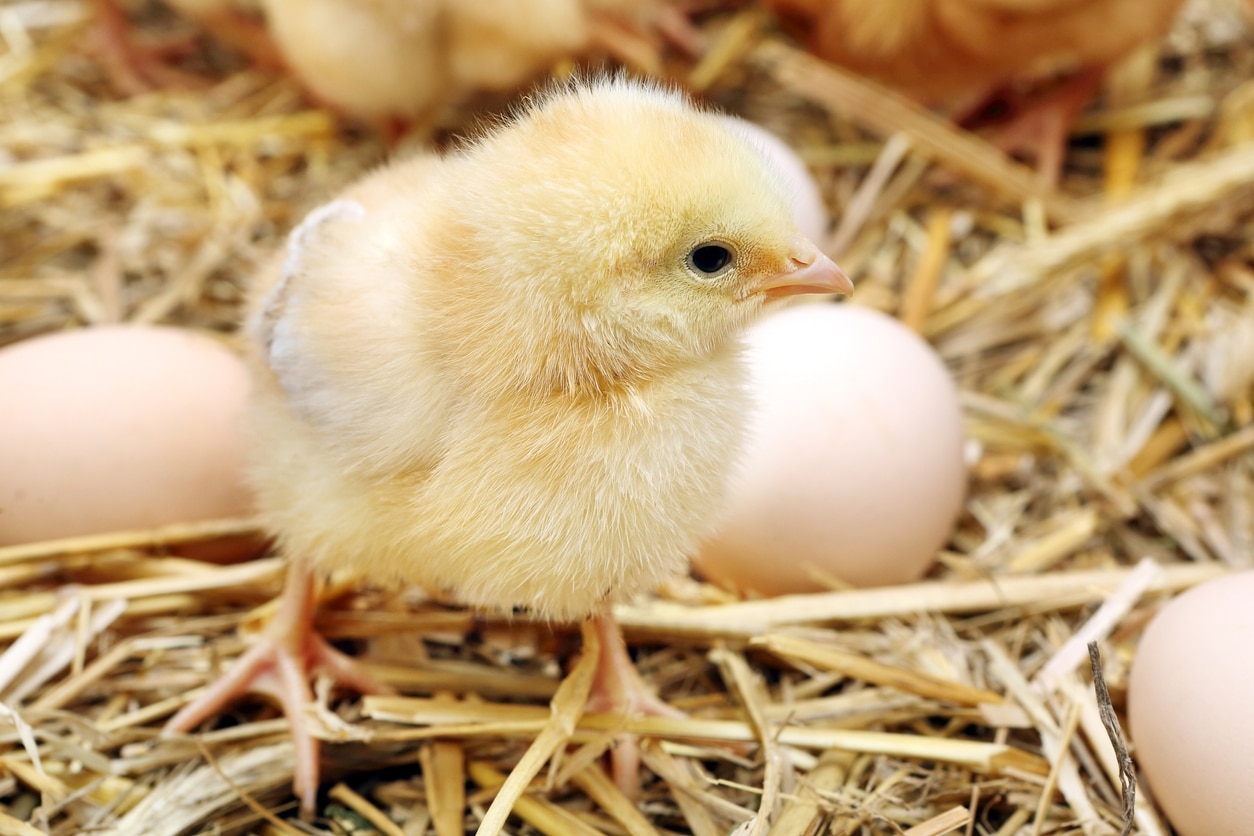If you’re caring for baby chicks, you’ll need to remember that it’s much different than looking after full-grown chickens. While chicks are fairly easy to raise and care for, there’s still a lot you’ll need to know beforehand.
So, here are some tips for how to successfully raise baby chicks in a healthy environment. Chicks have a lot of benefits to your coop, so be sure to consider all the aspects of their care before getting them.
[toc]
Where Should You Get Baby Chicks From?
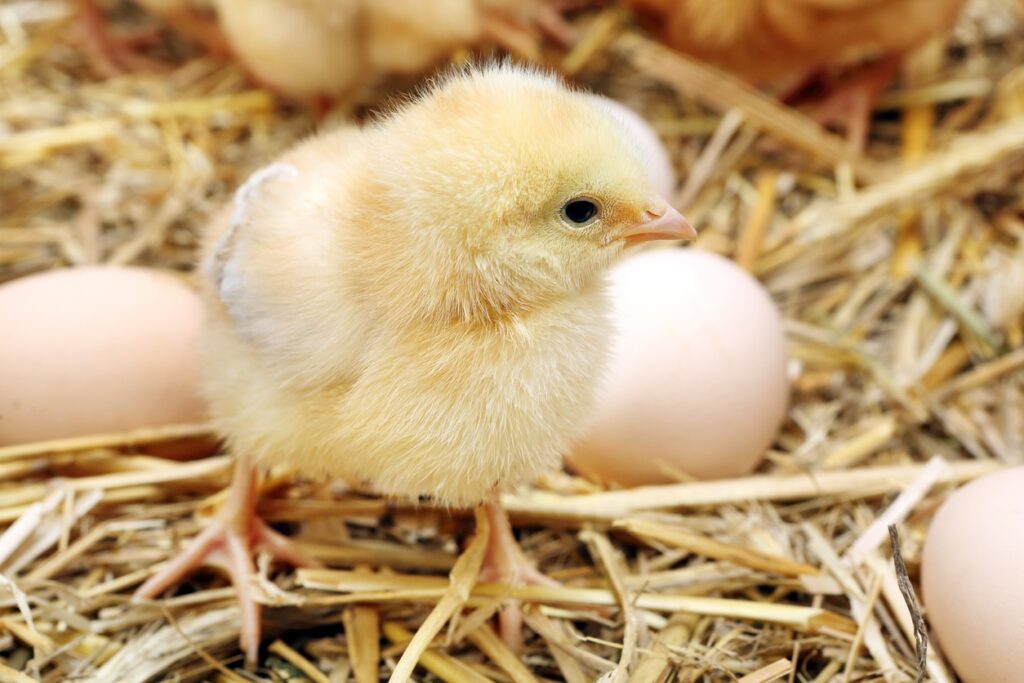
If you’ve never owned baby chicks before, it’s a good idea to be patient when choosing the right ones. Settle on the breed that’s most suitable for your coop and figure out where you’d like to get them from.
When getting baby chicks, there are two main options that most keepers go for.
Breed Them Yourself
If you already have chickens in your care, then you can choose to hatch your own chicks. You’ll need to have a rooster in the coop to fertilize the eggs, and then, eggs with chicks in them will eventually appear.
Find a Reputable Breeder
If you don’t have any chickens yet or if you don’t want to breed them yourself, you can purchase chicks from someone else. Day-old chicks are usually the cheapest because you’ll have to raise them before they can lay eggs. If you want a chicken that will add eggs to your coop sooner, consider buying a pullet or adult hen instead.
Be careful about which breeders to trust since some might sell sick chicks. The breeder should be knowledgeable about the breed and should be happy to answer your chick-related questions. If the breeder seems very quick to make a sale, it might be best to search elsewhere.
Benefits of Adding Chicks to Your Coop
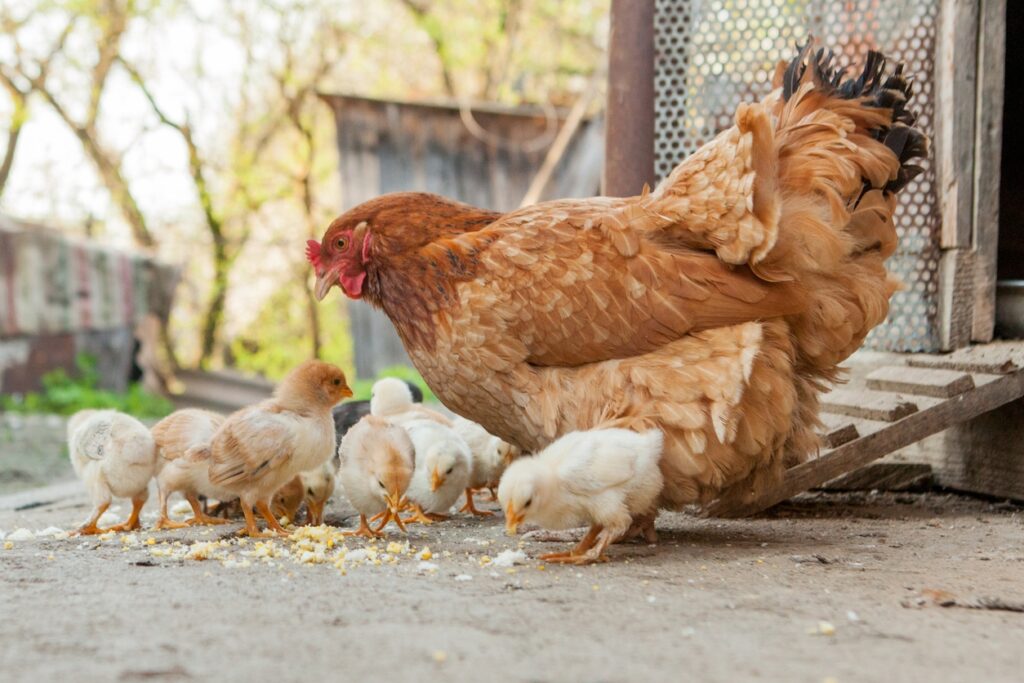
There are lots of benefits to caring for baby chicks. After all, they will grow up to provide for the farm in unique ways.
So, if you’re unsure why you should get more chicks, here are some pros:
- When old enough, they can produce eggs.
- If needed, they can be used for meat.
- They can get rid of pesky weeds and bugs.
- They look beautiful when full-grown.
- Some chickens make great pets instead of livestock.
Not all chicks are purchased for the same purposes. So, consider all these possibilities before deciding if chicks will benefit you. In many cases, they can be used for more than one purpose.
Caring for Fertilized Chicken Eggs
For keepers who breed chickens to get more chicks, caring for the eggs is an important step before caring for baby chicks. Here are some tips to keep fertilized chicken eggs healthy.
How Do You Know if a Chicken Egg is Fertilized?
The easiest way to check if an egg is fertilized or not is to hold it up to a light. If the egg appears opaque, it’s likely fertilized. You won’t be able to see through it as well as the other eggs. However, not every fertilized egg will become a chick.
If you accidentally crack a fertilized egg, you can tell if it’s fertilized if it has a small white spot at the top of the yolk. That spot is usually about 4mm wide, and it’s known as the germinal disc.
How Long Do Chicken Eggs Take to Hatch?
Eggs take 21 days to hatch into baby chicks. During each day in the embryo stage, chicks show distinct changes in development. By day 20, the chick should start trying to break its way through the shell. However, it’s possible for chicks to hatch a little bit early or late.
What to Prepare Before the Chicks Arrive
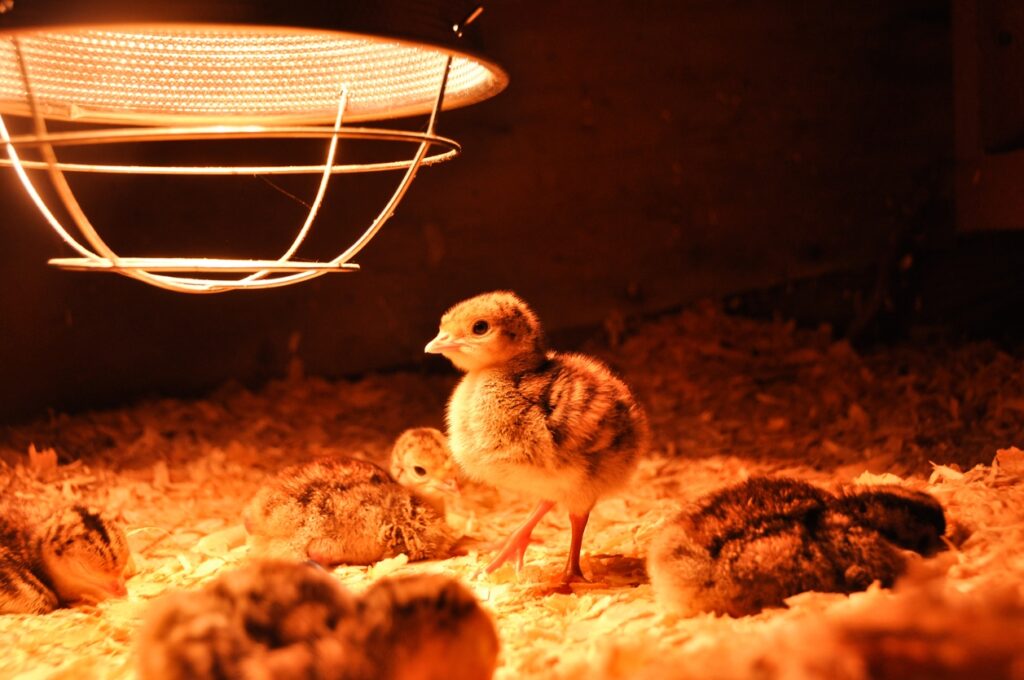
After the chicks hatch, you’ll want to move them to a warmer, safer location with necessary supplies. Even if the hens in your coop are broody, the chicks will still be safest in their own setup. So, here are some things to prepare.
Brooder
A brooder is a large container that will keep baby chicks warm and safe. It must be secure enough to keep chicks inside and predators outside. Also, it should have enough space for the chicks to move around with ease. Chicks in crowded spaces are more likely to pick on each other.
The space should be dry, free of drafts, and properly ventilated. If possible, your chicks should stay in the same space throughout the first few weeks of their lives.
Heat Source
Inside the brooder, there should be a heat source to keep your chicks healthy. The most common heat source is a red heat lamp. However, many keepers use a heat plate instead since it has a consistent temperature.
You can tell if the temperature is ideal based on the chicks’ reactions. If the chicks are all huddled near the heat source, they’re too cold. Yet, if they’re as far as possible from the heat, they’re too hot. So, adjust the temperature accordingly.
Food and Water
You’ll need to find containers to hold the food and water for your chicks. You can purchase a feeder and waterer set, which will help reduce the mess after chick feeding. You should have at least one set of containers for every 10 chicks.
Then, have some food ready to serve to your chicks. Start by giving them a feed that has at least 24% protein. Then, after a few weeks, you can change it to a 20% protein crumble.
Bedding
Finally, chicks should have a comfortable bedding or litter beneath them after they hatch. Pine shavings are the cheapest and most common option. Some other types of bedding are pellets, shredded paper, grass clippings, dried leaves, straw, and sand.
Whatever bedding you choose, make sure it’s easy to clean. You’ll need to replace the bedding anywhere from once a day to once a week depending on how many chicks you have.
Tips for Raising Baby Chicks After Hatching
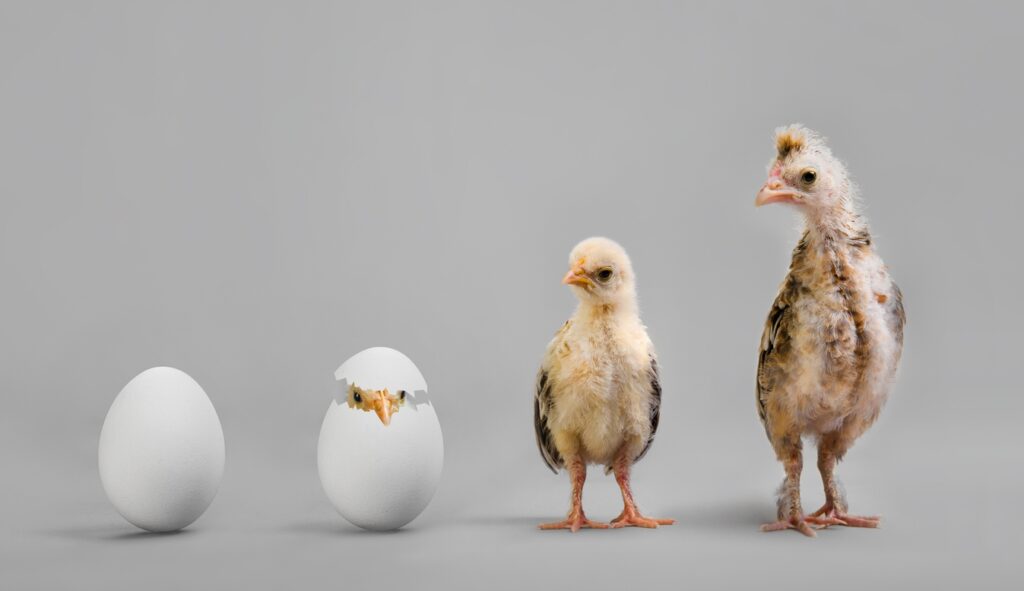
Baby chicks go through lots of changes from the moment they hatch to when they become full-grown chickens. Here’s what new keepers can expect during each stage of a chick’s life.
Yet, it’s important to note that all chicken breeds mature at different paces. So, this timeline won’t be exactly the same for every chick.
Week 1
The first week of caring for baby chicks will likely be the most intense. You’ll need to show them where the food and water is, but it won’t take them long to figure out their surroundings after that.
It’s fun to watch the chicks explore on their own and socialize with each other. As you observe their behaviors, it’s your job to clean up after them and keep their brooder in shape. The brooder’s temperature should be about 90 degrees Fahreheit.
Weeks 2-4
At this point, the chicks will start to lose their fluff and grow in real feathers. You can start to interact with them more as that happens. If you want, you can feed the chicks snacks by hand, such as chopped up vegetables.
At week 2, the temperature should be around 85 degrees Fahrenheit, but by the end of week 4, you can decrease it to 75 degrees. During this time period, the chick might want to start roosting, so add a perch area to their enclosure.
Weeks 5-7
A lot of changes occur for your chicks in these weeks. They will molt some of their feathers to make room for their adult feathers. If the outside temperature is 60 degrees Fahrenheit or greater, you can turn off the heat source. However, you might have to leave the heater on at night, depending on the weather.
During this time, you can also choose to move them to an outside coop space if you’d like. Don’t mix them with the adult chickens yet, but give them time outside to let them forage and explore. This will give them a gradual transition to the adult chicken coop.
Weeks 8-14
Depending on the breed of your chicks, you can start adding them to the regular coop within this time period. Wait until they’re at least 2/3 the size of the adults before moving them to prevent them from getting bullied.
Chickens usually dislike change, so going through their teenage weeks (also known as the pullet stage) can be stressful for them. Stress can affect a chicken’s egg-laying capabilities, so try to keep their routine as consistent as possible when transitioning their location.
Most chickens will fight a bit when in a new coop, but it usually consists of dramatic pecking and shoving with no bloodshed. That’s how chickens determine who the most dominant birds in the coop are. It’s a harmless behavior that you shouldn’t worry about.
By the end of week 14, nearly every chicken will look like a full-grown adult. They should also be friendly and comfortable around you and anyone else who helped raise them.
Tips for Caring for Baby Chicks
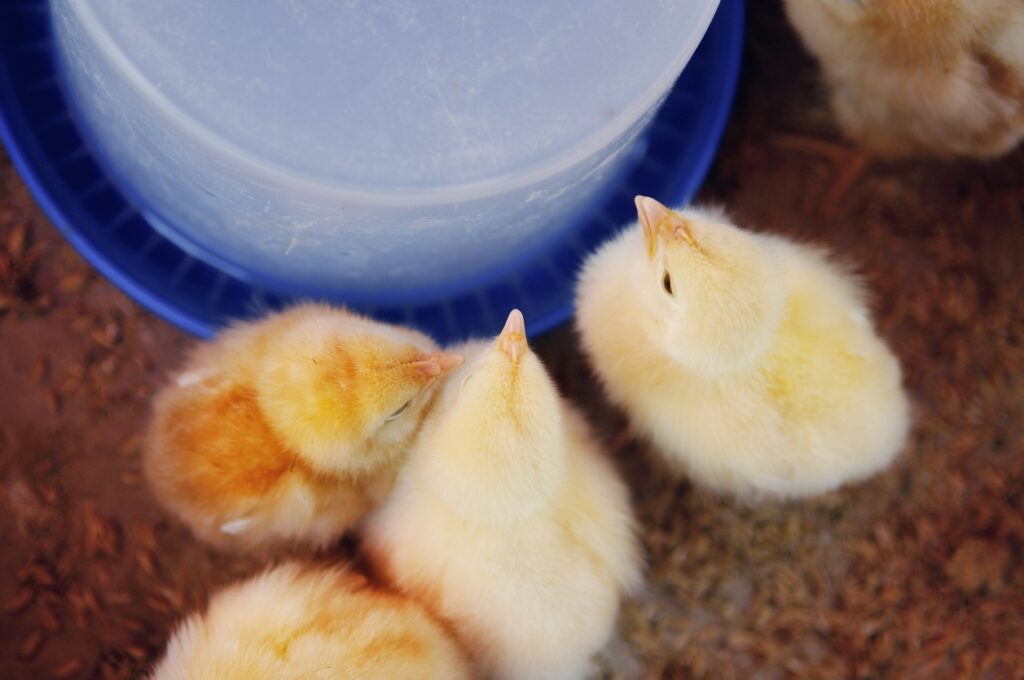
Now that you know the step-by-step process for raising baby chicks, let’s take a closer look at the details on caring for them. For the most part, you’ll just need to ensure that they have proper shelter and enough food.
What Do Baby Chicks Eat?
Baby chicks don’t need to eat or drink immediately after hatching. For their first 48 hours of life, they’re still sustained by the yolk of the egg, which was absorbed into their body. So, they can still thrive even if they’re not given food right away.
A properly balanced starter feed is the best diet for your chicks. However, you shouldn’t give chicks an adult feed since it has too much calcium and not enough protein. Instead, look for an organic chick feed that’s high in protein. Around 20% to 25% protein is normal for baby chick feeds. As they grow up, you can slowly decrease the protein percentage.
As chicks grow up into pullets, they can spend time foraging outside too. Some healthy snacks they might find and enjoy are worms, crickets, lettuce, tomatoes, and oatmeal. Yet, these treats should be eaten in addition to their feed, not in place of.
Do Baby Chicks Have Common Health Concerns?
Chicks that are running around, making sounds, and exploring are likely healthy. If there are chicks that don’t have as much energy, they might not be healthy. Keep a close eye on them to see if there are any signs of illness.
Here are common health concerns for baby chicks:
- Coccidiosis – This parasitic disease attacks the gut and prevents chicks from processing food. Medicated food can help prevent it.
- Vitamin Deficiency – This can cause physical issues, such as crooked toes. Giving chicks an electrolyte and vitamin supplement can fix this.
- Feather Picking – Overcrowding and boredom can cause chicks to pick at their feathers. Providing them with more space and other things to peck at will keep their feathers safe.
- Pasty Butt – Sometimes, feces might dry around a chick’s butt, causing a blockage. This is a sign that the brooder is too warm, and you’ll likely need to clean the chick yourself. Yet, make sure the chick is fully dry before putting them back.
- Deformities – Chicks can be born with untreatable deformities, but it doesn’t have to affect their quality of life. A common problem is a crooked beak, which may be able to be trimmed to improve their wellbeing.
There are lots of problems that baby chicks could face, but if you’re caring for them regularly and supplying quality food and water, they’ll likely turn out just fine.
How to Safely Handle Baby Chicks
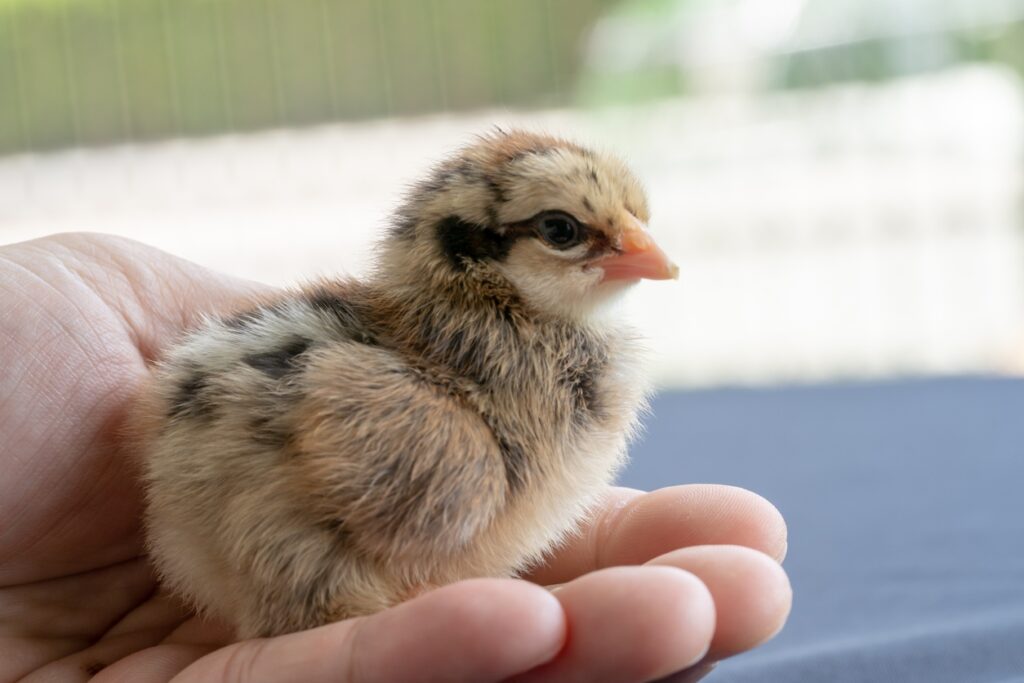
To keep both you and the chicks healthy, you’ll need to practice safe handling. After anyone touches live chicks or chickens, they should thoroughly wash their hands. Never touch your face while handling animals. Also, children under 5 shouldn’t handle baby chicks.
Never keep chickens in areas where human food and water is present. It’s a good idea to regularly clean equipment, such as cages and food containers, to prevent the spread of any diseases.
Overall, be gentle and cautious when it comes to chick handling. As cute as chicks are, they can pass germs to humans, which is why hand washing is so crucial.
Most chicks become adults when they are 16 to 24 weeks old. This depends on the chicken breed, and most keepers classify adulthood as when the birds reach sexually maturity and start laying eggs.
Again, this milestone varies greatly based on breed, but most hens start laying eggs at about 18 weeks olds. At that point, the chickens will look full-grown. After they lay their first egg, they will start laying regular amounts of eggs each week. Most hens lay about one egg per day.
Caring for baby chicks isn’t too hard once you get the hang of it, but it’s important to be confident about the basics before doing it yourself. Chicks need a warm, dry environment for their early days, along with nutritious food and clean water.
Raising chicks is a good idea if you’re looking to add more egg-laying birds to your coop. Yet, always remember to research breeds to find out which one best fits your needs.
